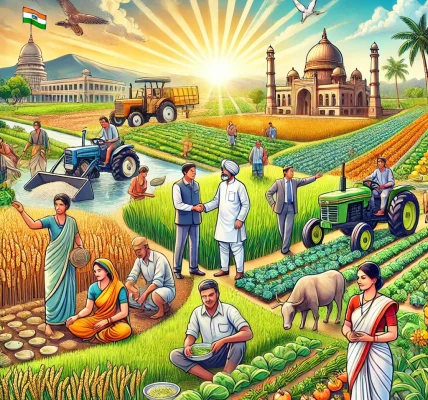Introduction
The agricultural sector is the backbone of India’s economy, and energy plays a crucial role in modern farming practices. Rising electricity costs and unreliable power supply have made traditional farming methods less efficient. Solar energy presents a sustainable and cost-effective alternative, and the Indian government has introduced various solar energy subsidies for farmers to encourage renewable energy adoption in agriculture.
In this blog, we will explore key solar energy subsidy schemes, their benefits, and how farmers can apply for them without an agent, ensuring they get the full advantage of these government incentives.
1. Importance of Solar Energy in Agriculture
- Cost Savings: Solar-powered irrigation systems reduce dependency on expensive diesel and grid electricity.
- Reliable Energy Source: Solar power ensures continuous electricity supply, reducing the impact of power cuts.
- Environmentally Friendly: Reduces carbon footprint and promotes sustainable farming.
- Government Support: Various subsidy programs make solar energy affordable for farmers.
2. Key Government Subsidies for Solar Energy in Agriculture
a) PM-KUSUM (Pradhan Mantri Kisan Urja Suraksha evam Utthaan Mahabhiyan)
One of the most popular schemes, PM-KUSUM, aims to help farmers install solar-powered pumps and grid-connected solar power plants.
Components of PM-KUSUM:
- Component A: Setting up grid-connected solar power plants (up to 2 MW capacity).
- Component B: Providing 70% subsidy on the installation of standalone solar-powered pumps.
- Component C: Helping farmers solarize their existing grid-connected pumps.
b) Solar Pumping Program under NABARD
- Offers subsidized loans for farmers to install solar pumps for irrigation.
- Interest rates are lower compared to regular agricultural loans.
- Encourages community-based solar irrigation projects.
c) State-Specific Solar Subsidy Programs
Many Indian states offer additional subsidies on solar energy solutions. Some examples include:
- Maharashtra Solar Ag Pump Scheme: Provides up to 95% subsidy on solar pumps.
- Rajasthan Solar Energy Policy: Offers financial aid for farmers to set up solar farms.
- Gujarat Solar Rooftop Scheme: Helps farmers install solar panels on their rooftops for energy independence.
3. How to Apply for Solar Energy Subsidies Without an Agent?
Farmers can apply for government solar energy subsidies independently, avoiding unnecessary agent fees. Here’s how:
Step 1: Check Eligibility
- The farmer must have a valid Aadhaar card and land ownership documents.
- Should be engaged in agriculture-related activities.
- Must have access to a bank account linked to Aadhaar.
Step 2: Gather Necessary Documents
- Aadhaar Card
- Land Ownership Certificate
- Electricity Bill (if applicable)
- Bank Passbook Copy
- Duly filled application form
Step 3: Apply Online
Farmers can apply online through official portals:
- https://mnre.gov.in – Ministry of New and Renewable Energy.
- https://pmkusum.mnre.gov.in – PM-KUSUM official website.
- State government portals for region-specific subsidies.
Steps to Apply:
- Register using an Aadhaar-linked mobile number.
- Fill in personal and farm details.
- Upload scanned copies of required documents.
- Submit the application and track status online.
Step 4: Offline Application Process
- Visit the nearest agriculture or renewable energy department office.
- Request an application form for the relevant scheme.
- Fill in details and submit the form along with necessary documents.
- Collect the acknowledgment receipt for tracking.
4. Benefits of Government Solar Subsidy Schemes for Farmers
- Up to 90% Government Subsidy reduces initial investment.
- No Dependence on Electricity Grids ensures uninterrupted irrigation.
- Lower Operational Costs compared to diesel or electric pumps.
- Income Generation by selling surplus solar power to the grid.
- Improved Productivity with an uninterrupted water supply for crops.
5. Legal Precautions to Avoid Fraud
- Apply only through official government websites.
- Avoid middlemen or unauthorized agents asking for fees.
- Keep copies of all submitted applications and approval documents.
- Verify the subsidy amount credited to your bank account.
Conclusion
Solar energy is revolutionizing agriculture by making irrigation systems cost-effective, reliable, and eco-friendly. With the help of government subsidy programs like PM-KUSUM and NABARD, farmers can switch to solar-powered solutions at minimal cost.
By applying directly through official channels, farmers can take full advantage of these subsidies without losing money to agents. This shift towards renewable energy will ensure long-term savings and environmental sustainability for Indian agriculture.
Interested in solar energy subsidies? Apply today and take the first step toward sustainable farming! ☀️🌾




